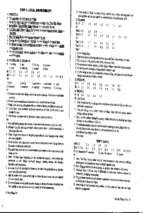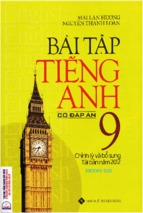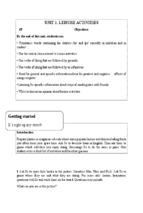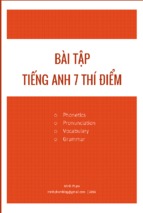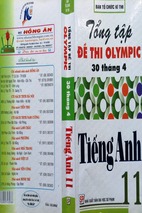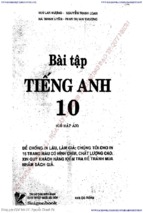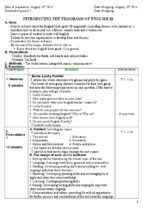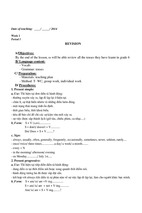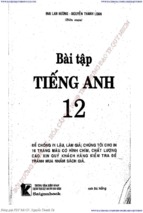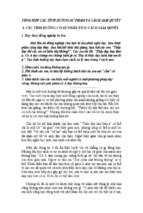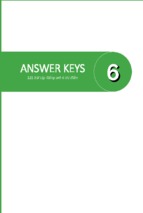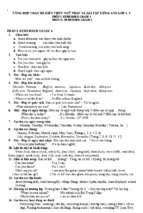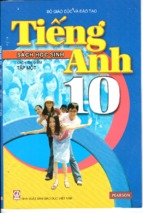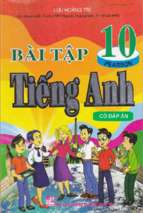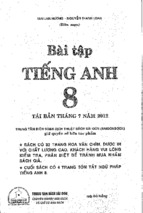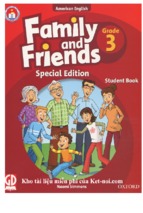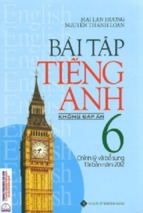SÔÛ GIAÙO DUÏC & ÑAØO TAÏO ÑOÀNG THAÙP
TRÖÔØNG THPT THOÁNG LINH
� �
BAØI TAÄP NGÖÕ PHAÙP
TIEÁNG ANH 10
(HOÏC KÌ II)
Bieân soạn: LEÂ NGOÏC THAÏCH
TAØI LIEÄU LÖU HAØNH NOÄI BOÄ
English 10
Period 1
LESSON 1: PASSIVE VOICE
The Passive Voice
1. Form
Active: S + V + O + …….
Passive: S + be + V3/ed + (by O) + ……
Ex: Active: She arranges the books on the shelves every weekend.
S
V
O
Passive: The books are arranged on the shelves (by her) every weekend.
S
be V3/ed
by O
2. Rules Khi ñoåi töø chuû ñoäng sang bò ñoäng, ta chuù yù caùc böôùc sau:
a. Xaùc ñònh S (Chuû töø), V (Ñoäng töø), O (Tuùc töø) vaø thì cuûa ñoäng töø trong
caâu chuû ñoäng.
Ex: Active: She arranges the books on the shelves every weekend.
S
V1
O
b. Ñem O leân laøm S, chuyeån S xuoáng laøm O ñaët sau by.
Ex: (P) The books are arranged on the shelves (by her) every weekend.
S
by O
c. Theâm ñoäng töø to be (phuø hôïp vôùi thì cuûa ñoäng töø trong caâu chuû ñoäng),
vaø chuyeån ñoäng töø chính sang V3/ed.
Ex: (P) The books are arranged on the shelves (by her) every weekend.
be V3/ed
3. Notes:
a. Trong tröôøng hôïp coù lieân töø and vaø giôùi töø of, ta phaûi xaùc ñònh ñaày ñuû
chuû töø hoaëc tuùc töø khi chuyeån ñoåi.
Ex:- Active: He and I see the film
� Passive: The film is seen by him and me.
- Active: He bought a box of chocolates last week
� Passive: A box of chocolates was bought last week.
b. Trong caâu bò ñoäng: by O luoân ñöùng sau adverbs of place (traïng töø chæ
nôi choán) vaø tröôùc adverbs of time (traïng töø chæ thôøi gian).
Ex: (P) The books are arranged on the shelves (by her) every weekend.
adv of place by O
adv of time
c. Trong caâu bò ñoäng, ta coù theå boû: by people, by us, by them, by
someone….
1
Ex: Passive: A new bridge has been built across the river (by them).
d. Trong caùc thì coù caùc trôï ñoäng töø (Auxiliary verbs) nhö: am/ is/ are, was/
were, has/ have, had……
Active: S + Aux + V + O + …….
Passive: S + Aux + be + V3/ed + (by O) + ……
Ex: - Active: They have built a new bridge across the river.
S Aux V
O
� Passive: A new bridge has been built across the river (by them).
S
Aux be V3
by O
- Active: Mai was watching a cartoon at 8 o’clock last night.
S Aux V
O
� Passive: A cartoon was being watched by Mai at 8 o’clock last night.
S Aux be
V-ed
by O
Active
Passive
S + V1 + O
S + am/is/are + V3/ed
S + am/is/are + V-ing + O
S + am/is/are + being +V3/ed
S + has/have + V3/ed + O
S + has/have + been + V3/ed
S + V2/ed + O
S + was/were +V3/ed
S + was/were + V-ing + O
S + was/were + being +V3/ed
S + had + V3/ed + O
S + had + been + V3/ed
S + will/shall + Vo + O
S + will/shall + be +V3/ed
----------------------------------------------------------------------------------------------English 10
Period 2
LESSON 2: EXERCISES (PASSIVE VOICE)
I/ Change these sentences into the passive voice
1. Somebody has robbed the bank near our house.
�…………………………………………………………….…………………..
2. Somebody told me to wait outside.
�…………………………………………………………….…………………..
3. Somebody has driven them to the airport.
�…………………………………………………….…………………………..
4. They will complete the new high way from north to south next year.
2
�…………………………………………………….…………………………..
5. My aunt made this sweater for her son.
�…………………………………………………….…………………………..
6. The television station has broadcast all the 22nd Sea-Games competitions.
�…………………………………………………….…………………………..
7. My teacher asked me to be here at 10 am.
�…………………………………………………….…………………………..
9. Thomas Edison invented the electric light bulb.
�…………………………………………………….…………………………..
10. She makes coffee for her parents every day.
�…………………………………………………….…………………………..
II/ Put the verbs in parentheses into the correct active or passive voice
1. Last night my favorite program________________ (interrupt) by a special
news bulletin.
2. When I______________ (arrive) at the airport yesterday,
I______________ (meet) by my cousin and a couple of friends.
3. Kim______________ (write) this composition last week. That one
_____________ (write) by Phi.
4. I don’t have my bicycle today. It’s with the repairman. It______________
(repair) right now.
5. Someone has bought the small lot behind my house and a new
house_______________ (build) on it next year.
6. A: Do you understand the explanation in the book?
B: No, I don’t. I_______________ (confuse).
7. A: When____________ your bike_______________ (steal)?
B: Two days ago.
8. A:__________ you_____________ (pay) your electricity yet?
B: No. I haven’t. but I’d better pay it today. If I don’t, my electricity
supply ______________ (shut off) by the power company.
9. A: Did you hear about the accident?
B: No. What________________ (happen)?
A: A bicyclist_____________ (hit) by a taxi in front of the dorm.
B: ___________ the bicyclist______________ (injure)?
A: Yes. He_______________ (take) to City Hospital.
10. The Eiffel Tower_____________ (be) in Paris, France. It_____________
(visit) by millions of people every year. It_______________ (design) by
Alexandre Eiffel (1832-1923). It_______________ (erect) in 1889 for the
3
Paris exposition. Since that time, it_______________ (be) the most famous
landmark in Paris. Today it______________ (recognize) by people
throughout the world.
English 10
Period 3
LESSON 3: PASSIVE OF MODAL VERBS + EXERCISES
Passive Voice of Modal Verbs
Caùc ñoäng töø khieám khuyeát (Modal verbs) nhö: can, could, will, would,
shall, should, may, might, must, had better, would rather, have to, be going
to, used to, ought to, ….
Active: S + Modal Verbs + Vo + O + …….
Passive: S + Modal Verbs + be + V3/ed + (by O) + ……
Ex: - Active: Nam can do this exercise right now.
S M.V Vo O
� Passive: This exercise can be done by Nam right now.
S
M.V be V3 by O
- Active: People are going to solve the problem next month.
S
modal verb Vo
O
� Passive: The problem is going to be solved (by people) next month.
S
modal verb be V-ed
by O
EXERCISES
Change these sentences into the passive voice
1. People should send their complaints to the main office.
�……………………………………………………………….………………..
2. Somebody might steal your car if you had left the keys in it.
�……………………………………………………………….………………..
3. A short circuit could cause the fire.
�…………………………………………………………….…………………..
4. Lan is going to invite her friends to her birthday party.
�…………………………………………………………….…………………..
5. Lien couldn’t open the door of the classroom.
�…………………………………………………………….…………………..
6. They should announce that news as soon as possible.
�…………………………………………………………….…………………..
7. Phong has to return the scientific book to the library.
�…………………………………………………………….…………………..
4
8. People must repair that old building.
�…………………………………………………………….…………………..
9. The government will rebuild the memorial monument.
�…………………………………………………………….…………………..
10. The students may elect Phong their leader.
�…………………………………………………………….…………………..
11. The teacher won’t accept papers written in pencils.
�…………………………………………………………….…………………..
12. The athletes might visit some interesting places after Sea-Games.
�…………………………………………………………….…………………..
13. Lan’s parents have to clean up their house before Tet holidays.
�…………………………………………………………….…………………..
14. The principal might interview her.
�…………………………………………………………….…………………..
15. They must keep fruit in the fridge for long.
�…………………………………………………………….…………………..
----------------------------------------------------------------------------------------------English 10
Period 4
LESSON 4: SPECIAL PASSIVE VOICE + EXERCISES
I. Theå bò ñoäng cuûa caâu phuû ñònh vaø nghi vaán:
Ex: - (A) Mai doesn’t write this letter.
�(P) This letter isn’t written by Mai.
- (A) They didn’t watch the fashion show last night.
�(P) The fashion show wasn’t watched last night.
- (A) Did your father make this chair?
�(P) Was this chair made by your father?
- (A) Who repaired your bicycle?
�(P) Whom was your bicycle repaired by?
(By whom was your bicycle repaired?)
- (A) What plays did Shakespeare write?
�(P) What plays were written by Shakespeare?
II. Ñoäng töø coù hai tuùc töø:
1. Ñoäng töø caàn giôùi töø TO: give, lend, send, show, …
Ex: - (A) John will give me this book. (=John will give this book to me.)
5
�(P1) I will be given this book by John.
�(P2) This book will be given to me by John.
2. Ñoäng töø caàn giôùi töø FOR: buy, make, get, …
Ex: - (A) He bought her a rose. (=He bought a rose for her.)
�(P1) She was bought a rose.
�(P2) A rose was bought for her.
III. Caáu truùc They/People say/think/believe… that …
Ex: - (A) People say that Henry eats ten eggs a day.
�(P1) It is said that Henry eats ten eggs a day.
�(P2) Henry is said to eat ten eggs a day.
- (A) They thought that Mary had gone away.
�(P1) It was thought that Mary had gone away.
�(P2) Mary was thought to have gone away.
IV. Caùc ñaïi töø baát ñònh: No one, Nobody, Nothing,………..
Ex: - (A) No one can answer this question.
�(P) This question can’t be answered.
- (A) They haven’t done anything.
�(P) Nothing has been done.
EXERCISES
Change these sentences into the passive voice
1. Nobody sent us any tickets.
�………………………………………………….……………………………..
2. Has someone decorated my bedroom?
�………………………………………………….……………………………..
3. Did anything disturb you in the night?
�………………………………………………….……………………………..
4. Nobody has invited her to the party.
�……………………………………………………………….………………..
5. She teaches grammar and writing.
�……………………………………………………………….………………..
6. People say that you send your application form to the university.
�……………………………………………………………….………………..
7. They elect Thu the leader of the group.
�……………………………………………………………….………………..
8. I don’t see anyone in the house.
6
�……………………………………………………………….………………..
9. Lan bought her brother some comic books.
�……………………………………………………………….………………..
10. The students don’t play video games on the weekend.
�……………………………………………………………….………………..
11. They believed that he went abroad to study English.
�……………………………………………………………….………………..
English 10
LESSON 5: RELATIVE CLAUSES
Period 5
I. Meänh ñeà tính töø hay meänh ñeà quan heä ñöôïc ñaët sau danh töø noù phuï nghóa,
ñöôïc noái baèng caùc ñaïi töø quan heä: WHO, WHOM, WHICH, THAT, WHOSE,
vaø traïng töø quan heä: WHERE, WHY, WHEN.
1. WHO: thay theá cho ngöôøi, laøm chuû töø trong MÑQH.
Ex: - I need to meet the boy. The boy is my friend’s son.
� I need to meet the boy who is my friend’s son.
- The woman is standing over there. She is my sister.
�The woman who is standing over there is my sister.
2. WHOM: thay theá cho ngöôøi, laøm tuùc töø trong MÑQH.
Ex:- I know the girl. I spoke to this girl.
� I know the girl whom I spoke to.
- The man is my teacher. Your father is talking to him.
� The man whom your father is talking to is my teacher.
3. WHICH: thay theá cho vaät, ñoà vaät; laøm chuû töø, tuùc töø trong MÑQH.
Ex: - She works for a company. It makes cars
� She works for a company which makes cars.
- The elephants are big. People keep the elephants in iron cages.
� The elephants which people keep in iron cages are big.
4. THAT: thay theá cho ngöôøi, vaät; laøm chuû töø, tuùc töø trong MÑQH.
Ex: - I need to meet the boy that is my friend’s son.
- The woman that is standing over there is my sister.
- I know the girl that I spoke to.
- The man that your father is talking to is my teacher.
- She works for a company that makes cars.
- The elephants that people keep in iron cages are big.
7
5. WHOSE (OF WHICH): thay theá cho sôû höõu cuûa ngöôøi, vaät (his-, her-, its-,
their-).
Ex: - John found the cat. Its leg was broken.
� John found the cat whose leg/(the leg of which) was broken.
- This is the student. I borrowed his book.
�This is the student whose book I borrowed.
6. WHERE: thay theá cho cuïm töø chæ nôi choán: there, at that place.
Ex: - The movie theater is the place. We can see films at that place.
� The movie theater is the place where we can see films.
7. WHY: thay theá cho cuïm traïng töø chæ lí do: for that reason.
Ex: - Tell me the reason. You are so sad for that reason.
� Tell me the reason why you are so sad.
8. WHEN: thay theá cho cuïm töø chæ thôøi gian: then, at that time, on that day.
Ex: - Do you remember the day. We first met on that day.
� Do you remember the day when we first met?
DANH TÖØ
CHUÛ TÖØ
TUÙC TÖØ
SÔÛ HÖÕU
Ngöôøi
WHO/THAT
WHO(M)/THAT
WHOSE
Vaät/Ñ.vaät
WHICH/THAT
WHICH/THAT
WHOSE/OF
WHICH
Nôi choán
WHERE
Lyù do
WHY
Thôøi gian
WHEN
II. Giôùi töø ñaët tröôùc meänh ñeà tính töø: (WHOM/WHICH)
Ex: - The man speaks English very fast. I talked to him last night.
� The man to whom I talked last night speaks English very fast.
- The house is for sale. I was born in it.
� The house in which I was born is for sale.
* LÖU YÙ: KHOÂNG duøng THAT sau giôùi töø.
The house in that I was born is for sale.
III. OF WHICH / OF WHOM:
Ex: - Daisy has three brothers. All of them are teachers.
� Daisy has three brothers, all of whom are teachers.
- He asked me a lot of questions. I couldn’t answer most of them.
� He asked me a lot of questions, most of which I couldn’t answer.
----------------------------------------------------------------------------------------------8
English 10
Period 6
LESSON 6: EXERCISES (RELATIVE CLAUSES)
I/ Circle the letter of the correct answer to complete the sentence
1. That’s my friend_______________ comes from Japan.
A. which
B. who
C. whom
D. where.
2. The plants which______________ in the living room need a lot of water.
A. are
B. be
C. is
D. was
3. She’s the woman_______________ sister looks after the baby for us.
A. who
B. which
C. that’s
D. whose
4. That’s the doctor for________________ Cliff works.
A. that
B. which
C. whom
D. whose
5. Marie,______________ I met at the party, called me last night.
A. that
B. whom
C. which
D. whose
6. I remember Alice,______________ rode the bus to school with.
A. I
B. whom I
C. which I
D. who
7. I used to enjoy the summer, ______________ we had a big family picnic.
A. where
B. when
C. which
D. that
8. Tell me about the city ______________ you grew up.
A. that
B. where
C. which
D. ø
9. Anna found the book that ________________ wanted at the bookshop.
A. ø
B. where
C. she
D. which
10. Please remember to take back to the library all the books
_____________ are due this week.
A. ø
B. that
C. when
D. they
II/ Complete the sentences, using a relative pronoun.
1. The girl chatted with him yesterday. She arrived here at 6:30.
�………………………………………………….……………………………..
2. The man is talking to my father.He spent 15 minutes measuring our
kitchen
�………………………………………………….……………………………..
3. The architect designed these flats. He has moved to HCM City.
�………………………………………………….……………………………..
4. The young man lives in the corner. He rides an expensive motorbike.
�………………………………………………….……………………………..
5. I’m reading the book. I bought it in 1996.
�………………………………………………….……………………………..
6. I will introduce the man to you. He is sharing the flat with me.
9
�………………………………………………….……………………………..
7. The young man is talking to our teacher. He is Ba’s brother.
�………………………………………………….……………………………..
8. We visited the monument. It was built a hundred years ago.
�………………………………………………….……………………………..
9. The boys are interested in football. It is a popular game all over the world.
�………………………………………………….……………………………..
10. The boy gave his parents big hugs before he left. He went abroad to
study.
�………………………………………………….……………………………..
11. My friends had so much fun at the festival. They wanted to go there
again.
�………………………………………………….……………………………..
12. Children like to eat ice-cream. It can cause toothache.
English 10
Period 7
LESSON 7: RESTRICTIVE & NON-RESTRICTIVE RELATIVE CLAUSES
I. Restrictive Relative Clauses
Duøng ñeå boå nghóa cho danh töø ñöùng tröôùc chöa ñöôïc xaùc ñònh roõ. Neáu boû
ñi meänh ñeà chính seõ khoâng roõ nghóa.
Ex: - I saw the girl. She helped us last week.
� I saw the girl who/that helped us last week.
II. Non-restritive Relative Clauses
Duøng ñeå boå nghóa cho danh töø ñöùng tröôùc ñaõ ñöôïc xaùc ñònh roõ, laø phaàn
giaûi thích theâm. Neáu boû ñi meänh ñeà chính vaãn roõ nghóa. Meänh ñeà naøy thöôøng
ñöôïc taùch khoûi meänh ñeà chính baèng daáu phaåy “,”.
Ta duøng meänh ñeà quan heä khoâng haïn ñònh khi:
- Tröôùc danh töø quan heä coù: this/that/these/those/my/her/his/…
- Töø quan heä laø teân rieâng hoaëc danh töø rieâng.
Ex: - My father is a doctor. He is fifty years old.
� My father, who is fifty years old, is a doctor.
- Mr Brown is a very nice teacher. We studied English with him.
� Mr Brown, who we studied English with, is a very nice teacher.
* LÖU YÙ: KHOÂNG duøng THAT trong MÑQH khoâng haïn ñònh.
Mr Brown, that we studied English with, is a very nice teacher.
III. Relative Pronoun THAT
10
* Nhöõng tröôøng hôïp thöôøng duøng THAT:
a. Sau cuïm töø quan heä vöøa chæ ngöôøi vaø vaät:
Ex: He told me the places and people that he had seen in London.
b. Sau ñaïi töø baát ñònh: something, aynyone, nobody,…….
Ex: I’ll tell you something that is very interesting.
c. Sau caùc tính töø so saùnh nhaát, ALL, EVERY, VERY, ONLY:
Ex: - This is the most beautiful dress that I have.
- All that is mine is yours.
- You are the only person that can help us.
d. Trong caáu truùc It + be + … + that … (chính laø …)
Ex: It is my friend that wrote this sentence.
(Chính laø baïn toâi ñaõ vieát caâu naøy.)
* Nhöõng tröôøng hôïp khoâng duøng THAT:
- Trong meänh ñeà tính töø khoâng haïn ñònh (xem LÖU YÙ muïc II)
- Sau giôùi töø (xem LÖU YÙ Lesson 5 muïc II)
EXERCISES
I/ Underline the relative clauses in the sentences. Then add commas to
separate the Non-restrictive relative clauses.
1. The man who is talking to the principal is our form teacher.
2. The boys who are sitting in the first row will receive the medals.
3. The students who are in the grade 10th are going to clean the school yard.
4. The animals which are kept in iron cages will be carried back to the forest
5. Mr Tan who is our gymaster is very thin and tall.
6. The book which we borrowed from the library must be returned by
Monday
7. The little boy who is crying over there lost his way.
8. Mrs Van who lives next door to Hoa works at the television station.
9. The dog which has some black spots is Ba’s.
10. My mother bought the shoes which were made from Hong Kong.
II/ Combine the two sentences by using a relative clause. Some clauses
need commas, some do not:
1. The lady is a famous writer. You met her at the party last night.
�………………………………………………….……………………………..
2. The child enjoyed the chocolates. Her mother bought them from France.
�………………………………………………….……………………………..
3. Dr Oley is our family’s dentist. He is a popular dentist in the city.
�………………………………………………….……………………………..
11
4. They drank a lot of Coke. It is diet Coke.
�………………………………………………….……………………………..
5. The river is the Sai Gon River. It flows through Ho Chi Minh City.
�………………………………………………….……………………………..
6. The girls are performing the play. They rehearsed it yesterday.
�………………………………………………….……………………………..
7. Their parents are anxious about their children. The children come back
late
�………………………………………………….……………………………..
8. The lecturer is my uncle. He gave an interesting talk on TV last night.
�………………………………………………….……………………………..
9. The student kept talking about the project. It was done last week.
�………………………………………………….……………………………..
10. Mr Phong hasn’t come yet. He is supposed to be at the meeting.
�………………………………………………….……………………………..
11. Lan went back home. She forgot to turn off the faucet.
�………………………………………………….……………………………..
English 10
Period 8
LESSON 8: REDUCED RELATIVE CLAUSES + EXERCISES
Ruùt goïn meänh ñeà tính töø thaønh cuïm tính töø:
I. Duøng V-ing hoaëc boû BE
Khi ñoäng töø chính trong meänh ñeà tính töø ôû theå CHUÛ ÑOÄNG hoaëc laø BE.
Ex: - Those people who are taking photos over there come from Sweden.
� Those people taking photos over there come from Sweden.
- Fans who want to buy tickets started queuing early.
� Fans wanting to buy tickets started queuing early.
- The books which are on that shelf are mine.
� The books on that shelf are mine.
II. Duøng V3/ed
Khi ñoäng töø chính trong meänh ñeà tính töø ôû theå BÒ ÑOÄNG.
Ex: - The books which were written by To Hoai are interesting.
� The books written by To Hoai are interesting.
- Most students who were punished last week are lazy.
� Most students punished last week are lazy.
12
EXERCISES
I/ Use reduced relative clauses in place of the relative clauses
1. Be sure to follow the instructions that are given at the top of the page.
�………………………………………………….……………………………..
2. Students who arrive late will not be permitted to enter the classroom.
�………………………………………………….……………………………..
3. John, who was taken by surprise, hardly knew what to say.
�………………………………………………….……………………………..
4. The people who are waiting for the bus in the rain are getting wet.
�………………………………………………….……………………………..
5. We drove along the road that was still flooded after the heavy rain.
�………………………………………………….……………………………..
6.The scientists who are researching the causes of cancer are making
progress
�………………………………………………….……………………………..
7.The wild ox which is kept at Nam Cat Tien National Park is of a special
kind
�………………………………………………….……………………………..
8. The helicopter which was flying toward the lake made a low droning
sound.
�…………………………….………………………….……………………………..
9. The winner of the marathon, who was breathing deeply and smiling at the
crowd, raised her right hand and waved.
�………………………………………………….……………………………………………………………..…………………………..
10. Any student who does not want to go on the trip should inform the office.
�………………………………………………….……………………………..
II/ Combine each pair of sentences into one sentence. Change the second
sentence of the pair into a reduced relative clause.
1. Our solar system is in a galaxy. The galaxy is called the Milky Way.
�………………………………………………….……………………………..
2. I come from a city. This city is located in the southern part of the country.
�………………………………………………….……………………………..
3. Anyone must take an entrance examination. Anyone applies to that school.
�………………………………………………….……………………………..
4. The boy drew pictures of people at the airport. The people were waiting
for their planes.
�………………………………………………….……………………………..
13
5. Sunlight wakes me up early in the morning. It comes through the window.
�………………………………………………….……………………………..
6. Only a few of the movies are suitable for the children. The movies are
shown on Channel 15.
�………………………………………………………………………….…………………………………….……………………………..
7. I was wakened by the sound of the laughter. It comes from the room next
door to mine.
�……………………………………………………………………………….……………………………….……………………………..
8. The students have become quite proficient in their new language. They
attend class five hours per day.
�……………………………………………………………………………………………………..………….……………………………..
9. Disney World is a famous amusement park. It is located in Orlando,
Florida, USA, and covers a large area of land.
�……………………………………………………………………………………………………………….………………………………..
10. Do you know the policeman? He is coming toward us.
�………………………………………………….……………………………..
English 10
Period 9
LESSON 9: CONDITIONAL SENTENCES (IF SENTENCES)
I. Conditional Sentences (If Sentences): Type 1
Ex: If I finish my homework, I will go to the concert
(= I will go to the concert if I finish my homework.)
* If clause:
If I finish my homework,
* Main clause: I will go to the concert
1. Form
If + S + V1….., S + will + Vo……..
2. Use
Dieãn taû moät ñieàu kieän coù theå xaûy ra ôû hieän taïi hoaëc töông lai.
II. Conditional Sentences (If Sentences): Type 2
1. Form
If + S + V2/ed…..., S + would/could + Vo……
(be � were)
2. Use
Dieãn taû moät ñieàu kieän khoâng theå xaûy ra ôû hieän taïi.
Ex: - If he had much time, he would help you.
(He doesn’t have much time now)
14
- If I were in your position, I could do that.
(I am not in your position now)
III. Conditional Sentences (If Sentences): Type 3
1. Form
If + S + had + V3/ed….., S + would/could + have + V3/ed…..
2. Use
Dieãn taû moät ñieàu kieän khoâng theå xaûy ra trong quaù khöù.
Ex: If we had studied hard last year, we would have got good marks.
(We didn’t study hard last year and we didn’t get good marks)
* Summary:
Type
If clauses
Main clauses
1
If + S + V1…..,
S + will + Vo……
2
If + S + V2/ed…..,
S + would/could + Vo……
(be � were)
3
If + S + had + V3/ed….., S + would/could + have + V3/ed….
IV. Notes
1. Unless: “If … not” coù theå ñöôïc thay baèng “UNLESS” (tröø phi):
Ex: - We will be late if we don’t hurry.
� We will be late unless we hurry.
- If I have time, I’ll help you.
� Unless I have time, I won’t help you.
2. Inversion: Boû IF trong 3 loaïi caâu ñieàu kieän (phaûi coù ñaûo ngöõ vôùi
SHOULD/WERE/HAD):
Ex: - If it should be necessary, I will go.
� Should it be necessary, I will go.
Ex: - If I were rich, I would buy a new car.
� Were I rich, I would buy a new car.
Ex: - If you had asked me, I would have told you the answer.
� Had you asked me, I would have told you the answer.
3. Moät soá töø/cuïm töø coù theå thay cho IF vôùi nghóa töông ñöông: provided
that; so(as) long as (mieãn laø); in case (trong tröôøng hôïp); on condition that
(vôùi ñieàu kieän)
Ex: You can borrow my book provided that you bring it back.
----------------------------------------------------------------------------------------------15
English 10
Period 10
LESSON 10: EXERCISES (IF SENTENCES)
I/ Delete the incorrect verb form.
1. I’ll send/ send you some information if you’ll tell/ tell me your address.
2. If Kate will be/ is late again, she’ll lose/ loses her job.
3. You’ll be/ are sick if you’ll eat/ eat all that ice-cream.
4. There won’t be/ isn’t enough room if everyone will come/ comes.
5. If we’ll go/ go out tomorrow evening, we’ll miss/ miss that new
programme on TV.
II/ Put the verbs in parentheses in the correct form to complete the
sentences or exchanges.
1. A: My mother always spends his money on expensive things.
B: If he ______________ (be) practical, he _______________ (can save)
some money.
2. A: Conservation programs have been introduced by most governments to
prevent reckless waste of land.
B: If there _______________ (not be) proper control by the governments,
the earth ______________ (be) greatly damaged now.
3. A: Last month, we paid a massive electricity bill.
B: If you ________________ (not waste) so much electricity, the bill
_____________ (not be ) so large.
4. If Mr. Brown ________________ (save) some money when he was young,
he ______________ (not be) so poor now.
5. A: The invitation says six o’clock.
B: Well, it’s six thirty now.
A: If we _______________ (start) earlier, we ______________ (not be) so
late now.
III/ Complete the following sentences, using the correct form of the
verbs in brackets.
1. Tom got to the station in time to catch his train.
If he (miss)____________ it, he (be)_____________ late for his
interview.
2. It’s good that you reminded me about Lan’s birthday. I (forget)
______________ if you (not remind)_______________ me.
16
3. Unfortunately, I didn’t have my address book with me when I was in New
York. If I (have)_______________ your address, I (send)_____________
you a postcard.
4. I took a taxi to the hotel but the traffic was very bad. It (be)___________
quicker if I (walk)_______________.
5. I didn’t know you were in hospital. If I (know)______________, I
(go)_______________ to visit you.
IV/ Use conditional sentence type 2 with would or could.
1. We can’t bathe in this part of river because the water is too dirty.
�…………………….…………………………………………………………..
2. We spend too much money on electricity because we have four air
conditioners in our house.
�……………………….………………………………………………………..
3. I can’t write to Linh because I don’t have her address.
�……………………….………………………………………………………..
4. Dick often causes accidents because he drives carelessly.
�……………………….………………………………………………………..
5. We can’t give much help to the poor because we waste a lot of money on
unnecessary things.
�……………………….………………………………………………………..
V/ Rewrite the following sentences, using Conditional Sentences Type 3
1. He didn’t hurry, so he missed the train.
�If
____________________________________________________________
2. My brother didn’t leave the car keys, so I couldn’t pick him up at the
station.
�If
my
brother
__________________________________________________
3. We didn’t go because it rained.
�
If
it
hadn’t
____________________________________________________
4. We didn’t go on holiday because we didn’t have enough money.
�If
we
_________________________________________________________
5. Susan felt sick because she ate four cream cakes.
�
If
Susan
______________________________________________________
17
6. Without this treatment, the patient would have died.
�
If
he
_________________________________________________________
7. We got lost because we didn’t have a map.
�If
we
________________________________________________________
8. He lost his job because he was late every day.
�
If
he
_________________________________________________________
9. Peter is fat because he eats so many chips.
If
____________________________________________________________
10. Robert got a bad cough because he started smoking cigarettes.
�If
Robert
______________________________________________________
11. Those people weren’t prepared to face the floods; therefore, the
consequence was disastrous.
�_____________________________________________________________
________________________________________
12. We didn’t enjoy our camping trip last week because it rained all the time.
�_____________________________________________________________
_
13. That village was heavily flooded last year because trees in the nearby
forests were cut down without control.
�_____________________________________________________________
________________________________________
14. We started our vacation too late, and we had to suffer bad weather.
�_____________________________________________________________
15. She didn’t take her friends’ advice; therefore, she failed in her business.
�_____________________________________________________________
18
English 10
Period 11
LESSON 11: ARTICLES (A, AN, THE)
I. Indefinite Articles: A/ AN
1. A/An ñöôïc duøng tröôùc:
-danh töø ñeám ñöôïc, soá ít.
*An: ñöùng tröôùc nguyeân aâm hoaëc “h”
caâm.
-trong caùc caáu truùc:
so + adj + a/an + noun
such + a/an + noun
as + adj + a/an + noun + as
How + adj + a/an + noun + verb!
-chæ moät ngöôøi ñöôïc ñeà caäp qua teân.
-tröôùc caùc danh töø trong ngöõ ñoàng vò.
-trong caùc cuïm töø chæ soá löôïng.
2. A/An khoâng ñöôïc duøng:
-ONE ñöôïc söû duïng thay A/An ñeå
nhaán maïnh.
-tröôùc caùc danh töø khoâng ñeám ñöôïc.
-tröôùc caùc danh töø ñeám ñöôïc soá nhieàu
II. Definite Article: THE
1. THE ñöôïc duøng tröôùc:
-nhöõng vaät duy nhaát.
-caùc danh töø ñöôïc xaùc ñònh bôûi cuïm
tính töø hoaëc meänh ñeà tính töø.
-caùc danh töø ñöôïc xaùc ñònh qua ngöõ
caûnh hoaëc ñöôïc ñeà caäp tröôùc ñoù.
-caùc danh töø chæ söï giaûi trí.
-tröôùc teân caùc taøu thuyeàn, maùy bay.
-caùc soâng, bieån, ñaïi döông, daõy nuùi…
-moät nhoùm caùc ñaûo hoaëc quoác gia.
Ex: a doctor, a bag, an animal, an
hour………
Ex: an animal, an hour………
Ex: She is so pretty a girl.
- It’s such a beautiful picture.
- She is as pretty a girl as her sister.
- How beautiful a girl you are!
Ex: A Mrs. Blue sent you this letter.
Ex: Nguyen Du, a great poet, wrote
that novel.
Ex: a pair, a couple, a lot of, a little,
a few, a large/great number of……..
Ex: There is a book on the table, but
one is not enough.
Ex: Coffee is also a kind of drink.
Ex: Dogs are faithful animals.
Ex: the sun, the moon, the world….
-The house with green fence is hers.
-The man that we met has just come.
Ex: Finally, the writer killed himself.
- I have a book and an eraser. The
book is now on the table.
Ex:the theater,the concert,the church
Ex: The Titanic was a great ship.
Ex: the Mekong River, the China
Sea,the Pacific Ocean,the Himalayas
Ex: the Philippines, the united States.
19
- Xem thêm -

